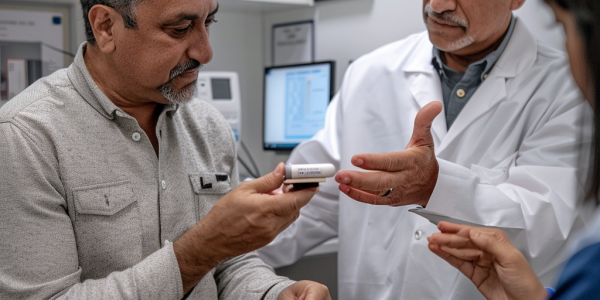Trial Shows Remarkable Improvements in Children with Peanut Allergies
Children with peanut and milk allergies are seeing significant improvements through a new trial funded by the Natasha Allergy Research Foundation. The trial involves using everyday foods to gradually increase patients’ tolerance to allergens, with participants like 11-year-old Thomas and five-year-old Grace experiencing life-changing results. The foundation, established in memory of Natasha Ednan-Laperouse, aims to find cures for allergies and advocate for food law changes.
Protein Marker Identified for Repairing Damaged Blood Vessels
Researchers at Indiana University School of Medicine have identified a protein marker that can help pinpoint cells capable of repopulating in individuals with damaged blood vessels. This groundbreaking discovery has the potential to revolutionize therapies for endothelial dysfunction and coronary artery disease. The study, led by Chang-Hyun Gil, Ph.D., MS, marks a significant milestone in the field of cardiology, offering hope for new cell therapies in repairing damaged blood vessels.
New Screening Test Esoguard Offers Hope for Early Detection of Esophageal Cancer
Learn about Esoguard, a new screening test in Long Beach, California, offering hope for early detection of precancerous issues related to chronic heartburn. Find out how this miniature capsule is revolutionizing the screening process for esophageal cancer, a condition that can often go undiagnosed until it’s too late.
Agriculture Commissioner Urges Horse Owners to Prioritize Vaccination Against Mosquito-Borne Diseases
Agriculture Commissioner Steve Troxler urges horse owners in North Carolina to prioritize vaccinating their animals against mosquito-borne diseases like Eastern Equine Encephalomyelitis (EEE) and West Nile Virus (WNV) due to the high fatality rates associated with these illnesses. Implementing preventive measures such as eliminating mosquito breeding grounds and using insect repellants can help protect horses from EEE and WNV. Recognizing symptoms early is crucial for prompt treatment, as there is no evidence to suggest that horses can transmit these diseases to other animals or humans.
Understanding Hypertrophic Cardiomyopathy: A Common Genetic Heart Condition
Learn about hypertrophic cardiomyopathy (HCM), a common genetic heart condition characterized by thickening of the heart muscle. Despite being potentially silent, HCM can lead to symptoms like increased heart rhythm issues and sudden cardiac death. Recognizing family history and genetic factors is crucial for timely diagnosis and treatment.
The Link Between Exercise, Muscle Function, and Brain Health
Discover the significant link between exercise, muscle function, and brain health in a recent study. Learn how neurons influence muscle secretions, the impact of glutamate on muscle activation, and the implications for aging and neuromuscular health. Find out how exercise-induced muscle secretions enhance brain function and the importance of maintaining the brain-nerve-muscle loop for overall well-being.
Study Identifies Gene KDM5B as Crucial for Learning and Memory in Mice
A recent study has identified a gene, KDM5B, that is crucial for learning and memory in mice. Reduced function of this gene in mice results in significant deficits in memory and learning abilities. KDM5B is essential for strengthening neuronal connections, vital for memory formation, and its discovery could lead to new treatments for conditions like autism and intellectual disabilities.
Tuberculosis case identified at Eastern Randolph High School
A recent report reveals a case of tuberculosis at Eastern Randolph High School in North Carolina. Health officials are working to identify individuals who may have been exposed, emphasizing the importance of public health measures in educational settings.
Nano-Scale Vision Implant Offers Hope for the Blind
The groundbreaking development of a nano-scale vision implant offers new hope for the blind, featuring ultra-small electrodes for enhanced visual perception. Utilizing a conducting polymer for longevity, the implant shows promising results in preclinical trials. Lead researcher Maria Asplund explains the implant’s functionality in creating a pixelated image, paving the way for future iterations with thousands of electrodes. This innovation marks a significant advancement in visual neuroscience, promising enhanced visual perception for the visually impaired.
Rise of Ultraprocessed Foods Linked to Childhood Obesity Concerns
Researchers have found a concerning rise in obesity rates among children, attributing it to the increased consumption of ultraprocessed foods (UPFs) like sodas, sausages, and cookies. These highly processed items have been linked to various health conditions, prompting experts to call for further research to understand their harmful effects on health.










